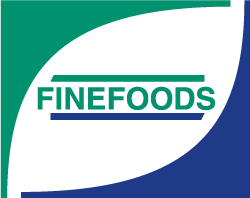
© 2024 FineFoods
ENVIRONMENT
Climate and sustainable resource management strategy

Introspezione e sviluppo con uno sguardo al futuro
In Fine Foods siamo convinti che introspezione e autoconsapevolezza
siano fondamentali per sapere cosa abbiamo da offrire, prima ancora di
dedicarci alla crescita del nostro team. Ogni persona che entra in Fine
Foods trova così meritocrazia e opportunità di crescita a ogni livello,
oltre a un ambiente strutturato in cui sentirsi parte attiva e
coinvolta.
Strategic objectives
"We want to prepare for a climate-neutral future and want to use natural resources available for future value creation."
Climate change
Fine Foods is aware of the issue related to current goods and energy production patterns and their effect on climate, and it wants to be part of the solution. The Group has begun its decarbonisation process, calculating its carbon footprint and defining future activities to reduce it. This includes installing systems for energy self-production from renewable sources, purchasing green energy from the grid, making processes and plants more efficient. These are the main projects on which our climate strategy is based.
Waste management and resource circularity
Fine Foods puts the protection of the Environment and its inhabitants first. The company minimises the amount of waste it produces. Where it is impossible, it reduces the waste sent for disposal to a minimum, systematically favouring production process residues and waste recovery.
Water consumption management
Reducing the use of water resources is one of the objectives Fine Foods wants to achieve. For this reason, consumption is regularly monitored, and measures to reduce waste are systematically applied.
Air and water protection
Environment protection is strategically and ethically crucial for Fine Foods. The company adopts the necessary operating procedures and plant solutions to eliminate or reduce its impact on the ecosystems to a minimum.
Biodiversity
Protecting biological diversity is important to ensure the survival of animal and plant species, genetic diversity and natural ecosystems. Natural ecosystems provide clean air and water and contribute to food security and human health. Thanks to its Environmental and Climate Protection Policy Fine Foods is committed to protecting biodiversity.
Climate change
Fine Foods is aware of the issue related to current goods and energy production patterns and their effect on climate, and it wants to be part of the solution. The Group has begun its decarbonisation process, calculating its carbon footprint and defining future activities to reduce it. This includes installing systems for energy self-production from renewable sources, purchasing green energy from the grid, making processes and plants more efficient. These are the main projects on which our climate strategy is based.
Waste management and resource circularity
Fine Foods puts the protection of the Environment and its inhabitants first. The company minimises the amount of waste it produces. Where it is impossible, it reduces the waste sent for disposal to a minimum, systematically favouring production process residues and waste recovery.
Water consumption management
Reducing the use of water resources is one of the objectives Fine Foods wants to achieve. For this reason, consumption is regularly monitored, and measures to reduce waste are systematically applied.
Air and water protection
Environment protection is strategically and ethically crucial for Fine Foods. The company adopts the necessary operating procedures and plant solutions to eliminate or reduce its impact on the ecosystems to a minimum.
Biodiversity
Protecting biological diversity is important to ensure the survival of animal and plant species, genetic diversity and natural ecosystems. Natural ecosystems provide clean air and water and contribute to food security and human health. Thanks to its Environmental and Climate Protection Policy Fine Foods is committed to protecting biodiversity.
KPIs
- -16 CO2 per million Euro of revenue
- 371 MWh/year of energy produced from renewable sources
- 353 cm of water consumed per million Euro of revenue
- 13% waste sent for recovery
Strategic projects
- All plants must possess an environmental management system certified under ISO 14001 standard
- Implementing measures to reduce emissions
- Implementing innovative strategies to decarbonise products/processes
- Projects to reduce water consumption
- Projects to reduce the amount of waste for disposal.
TARGETS AND KPIs
2023
- At least one awareness campaign on environmental education and responsible consumption issues
- At least one project to reduce water consumption.
- Aligning decarbonisation targets with science-based targets.
- Purchasing 100% green energy from the grid.
- At least two projects to reduce waste sent for disposal.
2025
At least 500 kW installed capacity for energy production from renewable sources
100% green energy purchased from the grid
100% ISO 14001 certified group companies
